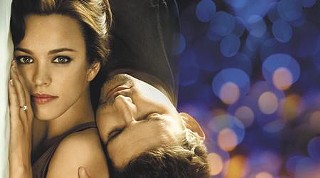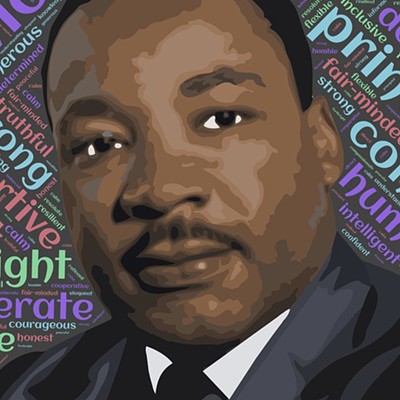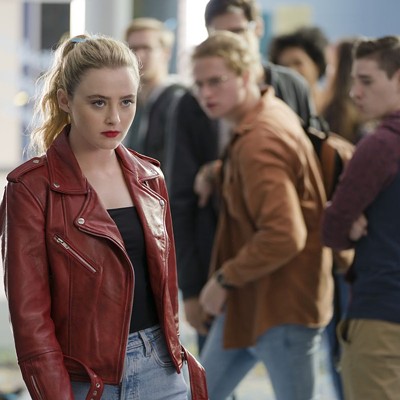INGLOURIOUS BASTERDS
***
Once upon a time, Hollywood used to believe less in the adage "War Is Hell" and more in its own bastardization, "War Is Swell." For over five decades, war was treated as a boys' adventure story, with the occasional sobering drama (e.g. All Quiet on the Western Front) the odd film out among countless movies that made viewers take delight in the wartime exploits of our fighting men (The Dirty Dozen, The Guns of Navarone, Where Eagles Dare, and on and on and on). The Vietnam War changed all that forever, with such titles as The Deer Hunter and Platoon putting a kibosh on matinee thrills and heralding in a new era of humorless (anti-)war flicks.
Even the World War II yarn, the most action-packed of all fightin' film genres, has been forced to go down this path, resulting in works as varied as the superb Saving Private Ryan and the doddering Valkyrie. If someone were to even think about making an old-school war film, complete with all the trimmings of fun and excitement and amazing feats of derring-do, it would immediately be shot down in today's culture as being in poor taste.
Now here comes Quentin Tarantino, who not only thought about making such a film (he's been thinking about it for at least a decade) but has followed through by actually bringing his vision to the big screen. And for all its freewheeling exploits and liberties with historical veracity, Inglourious Basterds is most decidedly not an exercise in poor taste or moral decay or what-have-you, but instead a celebration of film as its own entity, beholden to nothing but its own creative impulses. And by playing loose with history, it even provides a catharsis of sorts, the likes of which past WWII tales have never even attempted (not even Marvel Comics' wild and woolly series Sgt. Fury and His Howling Commandos).
One would be correct in assuming that Inglourious Basterds is a remake of 1978's international production Inglorious Bastards, but except for the similar title, the films have nothing in common. The joke is that Tarantino's film isn't even primarily about the Basterds; their significance as a fighting unit is so minimal that we never learn all their names, see each one's special skills or even know (unless you're sharp-eyed during the long shots) the total number of soldiers. Rather, Tarantino pulls his story this way and that, to the point that marquee star Brad Pitt, as Basterds leader Aldo Raine, is MIA for long stretches at a time.
In screen minutes, I would venture to guess that he places third under Melanie Laurent as Shosanna, the lone survivor of a massacre that left her family members dead, and Christoph Waltz as Hans Landa, the so-called "Jew hunter" responsible for the aforementioned slaughter. Pitt is fun to watch as he slurs his words all over the theater as the Basterds' Southern-fried top dog, but it's no great loss relegating him to the show position, with Waltz and Laurent occupying the win and place positions respectively. Waltz is especially memorable as the silky, brainy Landa; it's easy to see why he won a Best Actor award at this year's Cannes Film Festival.
Tarantino has long considered Howard Hawks (Rio Bravo, His Girl Friday) one of this country's greatest directors (I won't argue with that assertion), and like Hawks, he has a special appreciation for the beauty and power of dialogue. Inglourious Basterds is more talk than action, which means many will doubtless be disappointed by the final product (by Tarantino standards, it's not nearly as gruesome as one might imagine, one baseball-bat-to-the-head sequence notwithstanding). But Tarantino has always been a master of the written word, and the two talkiest segments here -- one set on a farm, one in a cellar -- are simply mesmerizing, with the suspense mounting with every spoken utterance.
Tarantino also continues to be as big a film fan as he is a filmmaker, and the movie is marinated in an unequivocal admiration for cinema. Dimitri Tiomkin's theme music from The Alamo ("The Green Leaves of Summer") opens the picture with suitable fanfare, while David Bowie's theme song from the Cat People remake figures in a surprising music video-like scene. One character ends up owning a movie theater (which serves as a climactic setting) while another major player, a heroic British officer (Michael Fassbinder), reveals that he was a film critic before the war broke out. There are even shout-outs to Hawks' Sergeant York and director G.W. Pabst, among others.
For all its attributes, Tarantino does make a couple of serious miscalculations. The stunt casting -- exploitation director Eli Roth as Raines' right-hand man, Mike Myers as a British officer -- doesn't work at all. And after 2-1/2 hours of leisurely storytelling, the ending feels disappointingly rushed, the sort of abrupt conclusion sure to leave a bad taste in the mouths of countless moviegoers. Truth be told, another half-hour wouldn't have damaged Inglourious Basterds; it moves so quickly anyway that it's (to quote a famous line about another movie) "history written with lightning" -- even if these particular chapters exist only in Quentin Tarantino's feverish imagination.
PONYO
***
Compared to past Hayao Miyazaki titles like Castle in the Sky and the Oscar-winning Spirited Away, the Japanese import Ponyo is minor-league stuff. But compared to the animated garbage that typically passes through stateside theaters, it's practically a godsend. This tale about a goldfish (voiced by Noah Cyrus) who longs to be human is a bit on the elementary side, and the translated dialogue (shaped by E.T. scribe Melissa Mathison) isn't up to snuff for a Miyazaki feature. But as always, Miyazaki fills the screen with so many wondrous images that viewers are immediately swept up in his fantastic universe. Tina Fey, Matt Damon and Cate Blanchett are among the name actors voicing various characters, although I was especially fascinated by the nautical wizard who spoke with the voice of Liam Neeson but looked less like Schindler and more like David Bowie in his Labyrinth garb.
THE TIME TRAVELER'S WIFE
**1/2
Movies involving time travel are so difficult to script that it's a wonder anybody even bothers to make them. Good ones like Back to the Future are calibrated well enough to allow audiences to understand and accept the ripples in the space-time continuum, but most trip over themselves as the filmmakers try to establish knotty rules they hope won't leave audiences so immersed in untangling the hows and whys that they forget to involve themselves in the characters and events. I suspect that many crucial details found in Audrey Niffenegger's best-selling novel failed to make it into Bruce Joel Rubin's script, meaning that some nagging questions -- combined with Robert Schwentke's aloof direction -- frequently keep us at arm's length. Nevertheless, Eric Bana as the man who travels back and forth through time and especially Rachel McAdams as the long-suffering woman who loves him bring enough heat to this up-and-down affair that it qualifies as an agreeable timefiller but not much more.


























